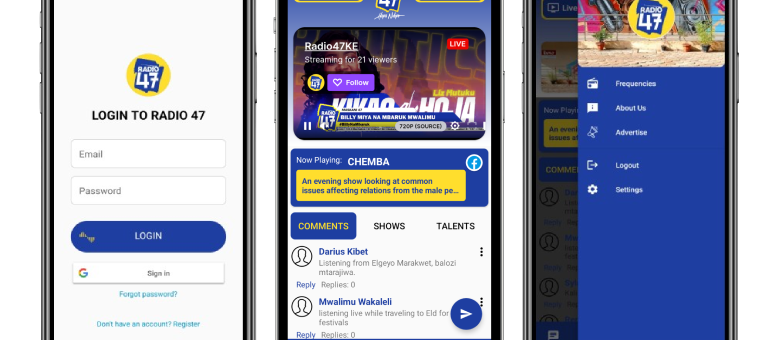Mobile app development is no longer just an accessory but a driving force behind business growth and customer engagement. In Kenya, the rising smartphone adoption, expanding internet access, and a youthful, tech-savvy population have created fertile ground for app innovation. From enhancing everyday services like banking and e-commerce to powering solutions in healthcare and education, mobile apps have become essential tools for both businesses and consumers. As the demand for smarter, faster, and more user-centric apps continues to grow, now is the perfect time for businesses to tap into this thriving digital economy.
Mobile Application Development
Creating successful mobile applications requires a delicate blend of innovation, technical skills, and user focus. Let’s dive into the world of mobile app development, from understanding what it is to exploring industry leaders and related services that enhance the process.
What is Mobile Application Development?
Mobile application development involves designing and building software programs that run on mobile devices like smartphones and tablets. These apps can be pre-installed on devices or downloaded and installed later through digital distribution platforms like the App Store or Google Play. Developers often prioritize various aspects during development, such as user-friendliness, speed, and seamless functionality, to deliver an unparalleled experience to users.
Mobile app development processes usually differ based on the intended platform— iOS, Android, or other alternatives—resulting in native, cross-platform, or web-based applications. For deeper insights into mobile app development, visit IBM’s Mobile Application Development resource.
4 Programming Languages Used for Mobile App Development
Some programming languages lead the mobile app development space, thanks to their powerful features and strong community support. Here are four of the most widely used:
- Swift: Designed by Apple, Swift is the go-to language for iOS app development. Its clean syntax, security features, and performance make it developer favorite for iPhone and iPad apps.
- Java: A cornerstone of Android app development, Java is known for its portability, vast libraries, and strong ecosystem. It’s particularly great for novice developers.
- Kotlin: Often thought of as Java’s modern sibling, Kotlin is entirely interoperable with Java. It offers enhanced productivity and it is supported as a primary Android language.
- React Native (JavaScript): Used for cross-platform app development, React Native provides a single codebase for both iOS and Android. It’s a game-changer for startups needing cost efficiency.
Consider exploring options on development languages tailored to your app needs on IBM’s analysis of programming languages.
Top Mobile App Development Company in Kenya
Choosing a reliable development partner is crucial whether you’re launching a startup or scaling an enterprise.
Onfrey is Kenya’s leading mobile app development company, building powerful, user-friendly apps for Android, iOS, and cross-platform. We help startups, SMEs, and enterprises bring their ideas to life with custom mobile solutions that are fast, functional, and beautifully designed.
Complete guide on Mobile App Development Process
Building a mobile app is more than writing code. It follows a structured process involving several stages:
- Strategy Development: Define app objectives, identify your audience, and plan the monetization strategy.
- Analysis and Planning: Map out detailed project requirements, including tech stack choices and team collaboration tools.
- UI/UX Design: Craft intuitive and attractive designs that ensure optimal usability.
- App Development: Write clean, efficient code and set up server configurations.
- Testing: Conduct rigorous QA testing to eliminate bugs and enhance performance.
- Deployment and Maintenance: Launch the app and provide regular updates to address new issues and user feedback.
Related Services in Mobile App Development
Mobile app development often involves various related services to enhance the end result. Here are some that deserve attention:
- UI/UX Design: Crafting visually appealing interfaces for a seamless user experience.
- Backend Services: Managing databases, APIs, and integrations to power the app’s functionality.
- App Marketing: Strategies like ASO (App Store Optimization) and user acquisition to boost downloads.
- Ongoing Support and Maintenance: Ensuring the app remains updated and functional amidst evolving tech trends.
- Product Discovery Workshops: These sessions identify business goals and confirm alignment between stakeholders.
Mobile App Development Types
Understanding the types of mobile applications is essential whether you’re a developer seeking to bring an idea to life or a business looking to enhance its digital presence. Each type comes with unique features and benefits that cater to different user needs and business goals.
Native App Development
Native apps are built specifically for individual platforms like iOS or Android, using their dedicated programming languages—Swift for iOS and Kotlin or Java for Android. These apps are optimized to take full advantage of a device’s functionalities, including cameras, GPS, and hardware.
By offering exceptional speed and performance, native apps show a remarkable ability to deliver seamless user experiences. However, their development can be costly as coding needs to be done separately for each platform. For businesses prioritizing quality, especially in terms of user interaction and reliability, native apps are the gold standard.
Hybrid App Development
Hybrid apps strike a balance between native and web apps. They’re developed using web technologies like HTML, CSS, and JavaScript but run within a native application shell. This allows them to access certain device features while being cross-platform compatible.
These apps often have a faster development timeline, making them ideal for startups or smaller businesses with budget constraints. However, they might not deliver the same level of performance or user experience as native applications.
Web App Development
Web apps are essentially websites optimized to mimic the feel of a mobile application. They run directly on browsers, eliminating the need for downloads or installations. While not as feature-rich as native or hybrid options, web apps offer universality as they can be accessed via any internet-enabled device.
The biggest advantage? Cost-efficiency. Since there’s no strict adherence to platform guidelines, one web app can work across multiple devices. This makes it a practical choice for businesses targeting a wide audience at lower costs. Learn more about web apps for a deeper understanding.
Enterprise App Development
Enterprise applications are tailored to solve specific needs within organizations. These apps are generally designed with a focus on productivity, including tools for communication, data management, and more. They are often deployed internally amongst employees or specific departments.
By incorporating robust security features and scalability, enterprise apps ensure the organization’s data remains protected while enhancing workflow efficiency. Think of them as digital workspaces aimed at streamlining tasks and collaboration.
Game Apps
Game apps dominate the app store charts and are arguably the most popular type of mobile application. These can range from simple puzzles to large-scale, immersive multiplayer experiences. Leveraging advanced technologies like AR (Augmented Reality) or VR (Virtual Reality), gaming apps have redefined entertainment.
Creating a successful gaming app requires meticulous attention to design, graphics, and user engagement. They also come with opportunities for monetization through ads, in-app purchases, or premium versions. To stay competitive, developers often rely on innovative tech and trends.
Each application type serves distinct purposes. Whether it’s about optimizing for performance, cost, or functionality, understanding these categories ensures that you choose the right development approach for your goals.
Our expert team of developers, designers, and digital strategists work hand-in-hand to transform your ideas into powerful mobile experiences. Whether you’re looking to build a customer-facing app, an enterprise solution, or a mobile commerce platform, we’ve got you covered — from concept to deployment and beyond.
Why choose Onfrey?
Experience in designing Apps

- Custom mobile app development
- UI/UX design that delights users
- Agile and collaborative development process
- Affordable pricing for businesses of all sizes
- Ongoing support and maintenance
Reach out to us today at
tel:(254) 768644458 ,
Mail to: [email protected]

